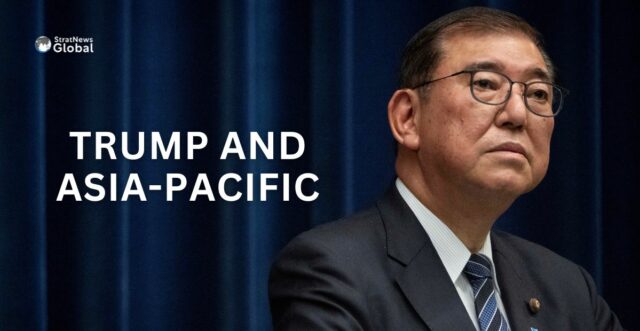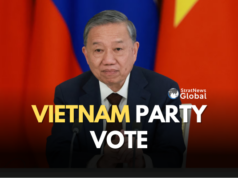U.S. President Donald Trump meets Japanese Prime Minister Shigeru Ishiba for the first time on Friday as two allies wary of China’s rise work to boost business and security ties while an escalating trade war threatens to rupture the global economy.
Trump’s relations with Asia-Pacific allies may be tested as his fight with China and warnings of tariffs threaten to disrupt commercial relations in Asia.
Trump put a 10% tariff on all imports from China in what he called an “opening salvo” in a clash between the world’s two largest economies, sending consumers and businesses scrambling to adjust.
Japan is especially trade-dependent: it is a major exporter and counts on imports for much of its food and natural resources, and many of its firms are deeply invested in and reliant on China.
Common Concern
Tokyo shares the hawkish outlook towards China of Trump’s national security team over Beijing’s global ambitions and extensive territorial claims in Asia, including the vital chip-producing island of Taiwan.
Japanese officials are wary of Beijing trying to court Trump with promises of cooperation on key global issues, including trade.
Japanese officials speaking privately say they are comfortable in dealing with Trump’s China hawks, including Secretary of State Marco Rubio and national security Michael Waltz, but less so with those in the administration with strong business ties with Beijing, such as billionaire Elon Musk, who has developed a significant Washington power base.
Trump and Ishiba are expected to hold a joint press conference on Friday afternoon.
Bracing For Trump Demands
For Tokyo, the early White House visit is a promising signal from the new Trump administration.
Trump was close with the late Japanese Prime Minister Shinzo Abe but has no relationship with Ishiba, who took office in October. That is something Japanese officials want to change, and they plan to invite Trump to visit Japan.
Japan is girding for Trump to demand concessions to reduce the $56 billion bilateral trade surplus and stave off the threat of tariffs.
Tokyo has been preparing some concessions, officials told Reuters, including considering offering support for a $44 billion gas pipeline in Alaska. SoftBank CEO Masayoshi Son has also promised to invest hundreds of billions in artificial intelligence in the U.S.
Options to increase manufacturing investment in the U.S., semiconductor chips and artificial intelligence are also expected to figure in the discussions.
There are areas of tension beyond trade, including the attempted takeover of U.S. Steel by Japan’s Nippon Steel. Former President Joe Biden blocked the deal but delayed its enforcement pending legal action; Trump has also vowed to block the deal.
However, there are also solid signs of stability and continuity in ties and the two leaders are expected to formally agree to language touting their alliance and common views on the economy and security issues, including China and Taiwan, according to another official familiar with the discussions.
(With inputs from Reuters)





